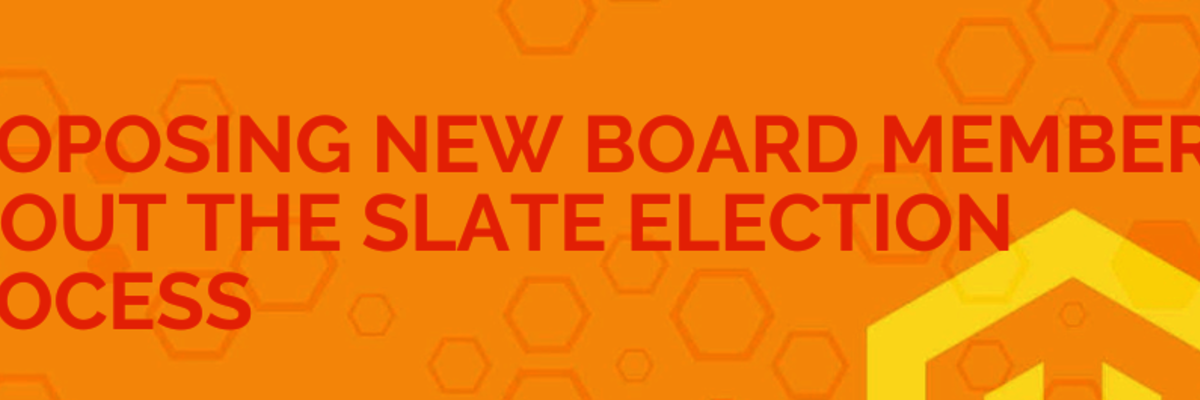
Proposing New Board Members – About the Slate Election Process
In 2022, three new members have been selected for the Magento Association Board of Directors. One new board member, Sonal Puri, was directly elected by all paying members. Two more have been proposed by the Election Committee and confirmed by the existing board and paying members.
With this blog post, the Election Committee aims to make the process more transparent and explain how we preselected Vatsal Shah and Willem Wigman for the board.
What Is a Slate Process?
In a slate process, new board members are not elected directly, but by an election committee. Especially in U.S. associations, this is a typical process. The idea in a slate process is that more criteria should be respected compared to a public election where the voters usually have limited time and insight.
What Is the Election Committee?
The Election Committee is a group of Magento Association members. Its purpose is to elect new board members and create and maintain the framework for elections.
The current Election Committee was created in late 2021. Its members were vetted by the Diversity & Inclusion Committee from those who applied. Current members who worked on the slate election include:
- Jeroen Boersma, Elgentos
- Tyler Jensen, Wolf Automation
- Mudit Shukla, CedCommerce
- Tink Taylor, DotDigital
- Andreas von Studnitz, integer_net
- Slava Kravchuk, Atwix (Board Liaison)
Additional Election Committee members who were involved in the direct election process did not participate in the slate election process due to time constraints, as completing the slate took an intensive amount of time.
An important role is filled by Jacqueline Gaggiano, Magento Association staff, who helps with organizing meetings and agendas, updating the website, contacting people and checking membership statuses.
The committee has met once a week via Zoom since February.
Step 1: Prepare an Open Application
The committee’s first task was to set up a timeline and prepare questions for an application form. We decided to have a single application form for the direct election and the slate process so candidates didn’t have to fill out two forms if they wanted to apply for a board seat.
Step 2: Gather Input from the D&I Committee
The D&I Committee was asked to provide suggestions on what diversity and inclusion criteria/information to gather from board applicants when selecting and evaluating candidates. This was provided to the Election Committee to aid in our review of the applications and also to inform us what is needed from potential board candidates from a D&I perspective when recommending the slate.
Step 3: Confirm the Direct Election Outcome
After the direct election ended, we had to verify the results (member votes were kept anonymous) and confirm the outcome. No fraud or mishandling was found during the verification process.
Step 4: Filter Slate Candidates to Be Interviewed
Excluding Sonal who was already elected, we had 14 applications. Unfortunately, due to time constraints, we couldn’t interview them all. We decided to create a rough ranking of the applicants by what we already had:
- The candidates’ application form content submissions
- Diversity and inclusion criteria (i.e., by region or industry)
- Their previous engagement in the Magento community (i.e., in other MA committees)
Every committee member filled a detailed personal score sheet for each applicant, which was then compiled by Jacqueline.
We didn’t define a target number upfront, but it turned out that there was a gap between the five best-ranked applicants and the next one. We decided to invite these five to be interviewed and inform the other candidates that they were not moving forward to the interview round at this time.
Step 5: Conduct Interviews
The interviews were planned for 60 minutes each. Due to time constraints and the desire for a smaller interview team per candidate, we didn’t have all Election Committee members present in all interviews. Instead, we prepared the interview questions together (a pool of questions for all applicants, plus some individual questions based on their past involvements or their applications) and had two committee members perform each interview. The interviews were recorded, so all committee members watched all of them at least once before submitting a final rating or starting discussions on the slate outcome.
Step 6: Discuss and Rate
This last step proved to be the most difficult task for us: Select two of the five final applicants that we would propose as new board members. All five would have been good additions to the board, and we didn’t want to exclude any of them. In the discussions, we found good reasons for all of them.
In the end, every committee member submitted a personal rating of the five applicants again, which resulted in two of them being on top: Vatsal Shah and Willem Wigman.
But, again, it was a really hard decision. All five would have been very suitable for a board seat. We are happy to have found a consensus that reflects all criteria.
Step 7: Confirm the Board Members
The suggested new board members still needed to be confirmed:
- By the existing board, which arrived very quickly
- By the paying members of the Magento Association. This took a bit longer but, in the end, a majority of the members confirmed the two new board members.
Our Learnings
There were a few things we didn’t anticipate in our planning but have learned for the future:
- Should the number of votes from employees of a single company be restricted? Should there be company memberships and/or company votes?
- Is it an issue if memberships are sponsored by other community members?
- We should intensify communication with the D&I Committee upfront and during the process next time.
As some of these questions are strongly related to the Magento Association bylaws, we have passed some of these questions on to the board so they can decide on next steps. It is also worth noting that the slate election process allowed us to eliminate the latter two questions and focus on evaluating the candidates thoroughly and thoughtfully.
Personal Remarks by Andreas
I am very grateful for getting the chance to be part of the Election Committee. It was a great learning opportunity. The interviews with the candidates have especially given me many insights on how others think about the Magento Association and the Magento ecosystem.
Being part of the Election Committee has changed my mind about the election process. At first, I thought that it would have been better to have two or even three of the new board members be elected by public vote. Having gone through all the discussions, I am now aware that there are many criteria that should be thought about when assigning board members — many more than most public voters (including me) would have respected. These include diversity and inclusion criteria, but also previous activity in the Magento Association and other parts of the community, how much time is someone able to spend or what the personal background and motivation is. Additionally, the public voting prefers longtime community members who are more popular, while the slate process does not care about popularity.
I feel confident that we managed to make a good, objective decision, despite the fact that personal and professional connections already existed between candidates and committee members.




